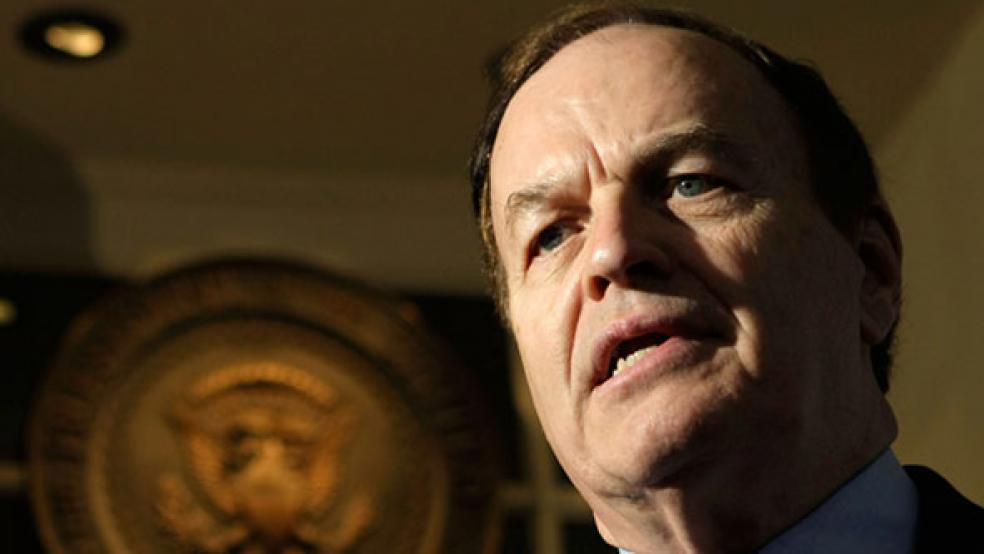As anyone who follows the Central Bank knows, President Obama’s nomination of Nobel Prize winning economist Peter Diamond to fill an open seat on the Federal Reserve Board of Governors is being held up by Senator Richard Shelby of Alabama, the top ranking Republican on the Senate Banking Committee. Shelby argues that Diamond is unqualified because he has little experience “conducting monetary policy, supervising our financial system, and responding to financial crises.” Thus, Shelby says, “Mr. Diamond’s background clearly demonstrates that he is not the right person for this particular job.”
Shelby continues, “Dr. Diamond is an old-fashioned, big government Keynesian. Many of us believe that this is not the economic philosophy the Fed should be embracing at this point in our economic history.” The objection is not just about qualifications, then; it’s based on ideology as well.
A Closer Look at the Political Reality
What’s clear is that the arguments about qualification don’t stand up to close scrutiny. While we certainly want some members of the Board of Governors to be academics who specialize in monetary policy, we also need experts in regulation, financial markets and institutions, international finance, labor markets, and so on, especially at a time when there’s is so much discussion about whether our employment problem is cyclical or structural, a critical distinction for monetary policy decisions. Having an expert on labor market issues would bring a very helpful perspective to the Board. Anyone inclined to support this appointment can find more than enough reason to do so.
But the objection from Senator Shelby and from Republicans more generally is best understood as political payback. Republicans are retaliating because Democrats blocked the reappointment of Randall Kroszner to the board based upon ideology rather than qualifications. Again, quoting Shelby, “For those who say that policy preference should not be considered, I will only point out that the re-nomination of Dr. Randy Kroszner
to the Fed was blocked by the majority party because he was viewed as being too free market.”
As a general rule, deference should be given to the president’s choice to fill open positions on the Fed’s Board of Governors. The system is designed to give presidents some influence over the board’s ideological composition, and as long as candidates are qualified, as both Kroszner and Diamond clearly are, the president’s choice ought to be honored.
But the system was also designed so that no single president could appoint enough board members to dominate monetary policy decisions. The full term for a Federal Reserve Governor is 14 years, and one of the seven non-renewable positions expires every other January. Thus, if governors serve full terms, a president can only appoint four members in an eight-year period. This is a majority of the seven member board, but since monetary policy is actually set by the Federal Open Market Committee, a 12-member committee that includes regional bank presidents, four appointments is not enough to guarantee control of monetary policy.
The system has not been working anywhere close to this ideal, and part of the problem is high turnover among Federal Reserve Governors. For example, board member resignations allowed President George W. Bush to fill all seven positions on the board, and thus a majority of the 12-member monetary policy committee. Before that, Bill Clinton made six appointments; Ronald Reagan made eight.
For this reason, I cannot blame members of the minority party in the Senate for taking an active role in trying to prevent the board from being stacked with a particular ideology or political makeup. In creating the Federal Reserve System in 1913, Congress never intended individual presidents would have this much control over the board’s makeup, and there ought to be checks on that power.
Too Many Board Vacancies – and Some Solutions
But those checks are either missing when the Senate and the White House are controlled by the same party, or prone to obstructionism when there’s divided government. And the situation becomes exacerbated when there are too many board vacancies. A case in point: The board briefly operated with just four members at the end of last year. The last time the Fed board operated without a vacancy was April 2006.
Difficulties getting candidates confirmed left the Fed short-handed during the financial crisis, a time when it needed all the help it could get. Problems with confirmation have also caused increased uncertainty over future policy and increased politicization of the Fed.
While there is much to criticize in the Senate’s oversight of the Fed, in this case the problem has more to do with the behavior of board members than the behavior of politicians. Some members have been unwilling to serve full terms because they opt instead for lucrative outside financial opportunities. (The salary for a Federal Reserve Board Governor, including the Vice Chairman, is $179,700.) The obstructionist, tit-for-tat behavior of politicians is largely a consequence of that high level of turnover on the board.
One solution, obviously, is for board members to pull up their socks and serve full 14-year terms, but we can’t compel them to do so. We can, however, expect people to honor their commitments. During confirmation hearings, candidates should be asked point blank if they intend to serve a full term, and the explicit conditions under which they would resign. The White House and lawmakers should make it clear that nominees who cannot make a long-term commitment to public service will not be given the job.
Some may dissemble to get through the confirmation process. But those who resign early for professional or economic advancement would dishonor themselves and all but rule out the opportunity for future government employment. They would also have to live with the fact that they contributed to the gridlock, politicization and uncertainty of the Fed appointment process.
Related Links:
GOP’s Shelby Roughs Up Fed Nominee Diamond (Reuters)
Fed Nominee Diamond Says His Research Helps Risk Identification (Bloomberg News)




